This post has already been read 479 times!
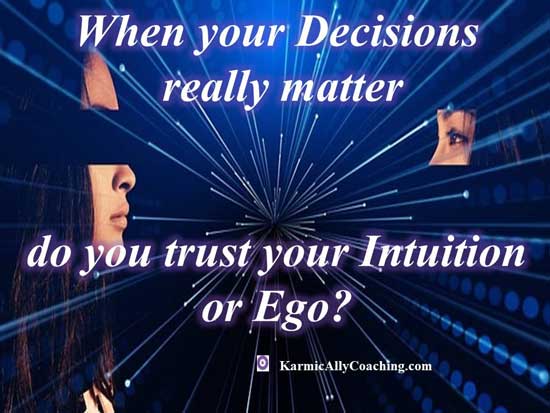
We all have the skill of intuition. The question is, how well have we developed it, and do we use it when our decisions really matter?
In my post on how intuition strengthens our emotional intelligence, I shared the story of the superhero boss. The entire office suspected he had ESP.
The Managing Director of our Insurance Company had his finger on the pulse of our insurance agents and clients, especially when it came to difficult claims.
High on emotional intelligence, our boss was also highly intuitive.
Quite often people confuse intuition with psychic abilities or pre-cognition but it is much simpler.
Intuition is a mental tool that we experience as a “knowing” or a gut feeling about something.
It is a form of instinctive knowing without the use of reasoning processes.
If you find yourself spot on about the outcomes of situations or are able to read in between the lines correctly, it’s because your intuition has been given enough reliable information that it can detect with accuracy what’s relevant and important in a situation and what is not.
Developing intuition starts by realizing you already have it.
If you’ve ever had a hunch about something, that was intuition. Intuition is just your mind using more than what you are consciously aware of.
But can you trust your intuition? How do you improve it?
Use these 3 Steps:
- Recognize it and encourage it.
- Study it to make it more trustworthy.
- Give it good information to work with.
The third point needs to be elaborated. Intuition is only good for areas where it has good data.
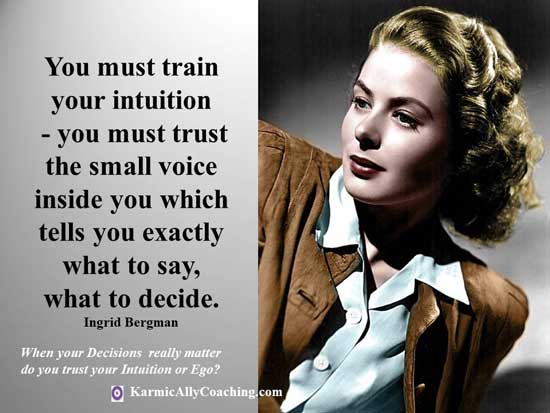
You may have good intuition in one area but terrible intuition in another area of your life. That happens because those areas are not being provided with enough good information or new information to work with.
Superhero boss had definitely developed his intuition in the business of insurance.
Consider the world-famous chess player Gary Kasparov. A computer can calculate chess positions many moves further ahead than he can and yet, he still beats the best computers out there because of his intuitive grasp of the game.
His experience allowed him to combine analysis with a “sense” of which move is best.
Likewise, we can develop our intuition in other areas of our life too. Try to find areas in your own life where you intuitively operate.
Are You Being Guided by Your Intuition or Your Ego?
Yet we often find our decisions can go wrong.
That’s because it’s not always easy to tell if our choices are coming from the right place.
If you follow your intuition, your life is likely to be enjoyable and meaningful. Follow your ego and you might be successful in many ways, but you’re likely to find yourself wondering why you’re not as happy as you think you should be.
Learning to determine whether you’re being guided by intuition or ego can make a huge difference in your life.
While there are no hard and fast rules to make the distinction, there are tendencies that can serve as a guide.
Consider these differences.
Ego-based decisions:
Are grounded in fear and self-preservation. If you decide to go to medical school or become a Chartered Accountant primarily for reasons of financial security, that’s ego.
Typically have emotion connected to them. A choice made from a place of intuition just feels “right” and often comes out of left field. You might be mowing the grass and be hit with the idea of becoming a dog breeder. The resulting battle in your head is your ego fighting back.
Consider external results. Are you writing a book in order to have a bestseller, or are you writing a book because you’re fascinated with the idea of writing a book? Are you taking an action to gain certain results, or does the action itself provide sufficient satisfaction?
Involve rationalization. Your ego is wonderful at convincing you that its choice is the right one. “I’ll never get that job. Imagine how disappointed I’ll feel when it doesn’t work out.” It’s really just a rationalization based on fear – fear of success or fear of failure.
The ego tries to justify itself with facts, figures, and logic.
Intuition doesn’t require these tricks to compel you.
If you’re using logic to convince yourself of a course of action, you can bet that’s your ego squawking.
Intuition doesn’t judge. A thought or decision arising from intuition doesn’t involve judgment statements about right or wrong, good or bad. Intuitive thoughts feel calm, relaxed, and peaceful. There’s a universal truth to an idea that arises from intuition.
Is the expected gratification coming from within or is it external. Would you make the same choice if no one would ever know? Would you purchase that Mercedes if no one ever knew you owned it? Or do you simply love German automobiles? Are you driven by money and admiration or by personal satisfaction?
While the ego can be very limiting, that doesn’t necessarily mean that it’s wrong.
The ego’s motivation is largely based on self-preservation. Your ego believes that it has your best interests at heart. Ignoring the ego can be a challenge because it uses fear to influence you. It’s only natural to avoid fear and seek comfort.
The trick is to realize when fear is holding you back from something bigger and better. Sometimes fear is keeping you from doing something foolish.
Think before choosing which voice to follow. There is another voice that can be mistaken for intuition and which you need to be aware of – insecurity.
Knowing the difference between Intuition and Insecurity in your Decision-making
Without a doubt, having to make life-changing decisions can be intimidating. You spend days and even weeks juggling between the options in front of you.
All you really want to do is make the best decision, but it’s stressing you out. Your gut instinct tells you to go one way, but you still hesitate.
Indecisiveness can make some situations more difficult than they actually need to be.
But what’s causing your indecisiveness?
You’re probably allowing insecurity to cloud your judgment and cause you to second-guess your intuition. Don’t worry – it happens to everyone.
It happened to me almost 2 decades ago when I experienced a family crisis and had to return to India to look after a parent. I loved my job and career, but I also had to think of my parent.
My intuition told me to go home and that things would work out while I also didn’t want to give up one of the most satisfying jobs I had ever had. It was a tough call but the right call because I allowed my intuition to guide me.
How will you know intuition is guiding you in the right direction?
Hindsight has 20:20 vision. This is what I learned and want to share with you.
- It’s constantly on your mind. Your intuition pushes you to constantly think about the impact of a decision. It’s difficult to get the thoughts off your mind when deep down you know the right thing to do. Don’t underestimate the power of your intuition!
- You feel sad when you go against your intuition. You usually feel relieved when you choose the option your intuition tells you. You feel as if a weight has been lifted off your shoulders. If you feel heavy after the decision, it means you’ve probably made an unfavorable choice.
It’s possible to feel sad after a tough decision if there is a negative impact on others. But that sadness should go away quickly if you’ve made a decision that’s truly right for you.
How will you know your decisions are being impacted by insecurities?
You will know this if you are doing either of the following:
You ask for the opinion of others. Usually, insecurity manifests itself in doubts. If you find yourself asking others for opinions on your potential decision, it means you aren’t fully sold on it yourself.
It’s always okay to seek advice but don’t let other’s opinions take precedence over your own thoughts. Bear in mind that the opinions of others may very well be based on those people trying to fulfill their own needs.
You’re considering the feelings of others first. When you consider how your decision can affect someone else first, chances are you’re insecure about something. If you’re struggling with a decision that will be life-changing for you, consider your own feelings first.Are you afraid of what others might think? Or are you concerned about how they may view you after the decision?
Remember that those who love you will support you in whatever decision you know will be best for you. The opinions of others aren’t your priority – you are!
Your values and morals are reflected in your intuition.
Once you develop a system for decision-making based on your values and morals, it’s likely going to be much easier to make important decisions. After a while, you’ll realize that the most important opinion is your own.
Embrace your decision-making abilities so you can eliminate insecurities.
You’re a wonderful person who deserves to confidently go through life. Start by believing in yourself and taking bold steps based on what your instincts tell you.
5 Easy Techniques to Develop Your Intuition
Parting words on why you need to trust your intuition for important decisions.
Being in touch with your intuition can help you identify and solve the challenges in your life that are causing stress. It also releases your imagination and creativity. Your intuition is a great resource, but it’s important to nurture it. Start with smaller things. When your intuition has proven it’s reliable, use it to make bigger decisions.
Intuition is a tether to the subconscious. It’s your ultimate source of wisdom and creative energy. Make life easier and richer by utilizing all of your resources.
Additional Information about Intuition and Developing Emotional Intelligence
Developing Your Self Awareness from Karmic Ally Coaching
Understanding Intuition: A Journey In and Out of Science, Dr Lois Isenman
Blink: The Power of Thinking Without Thinking, Malcolm Gladwell


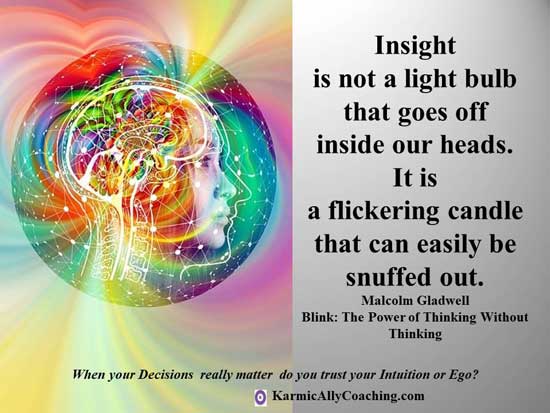
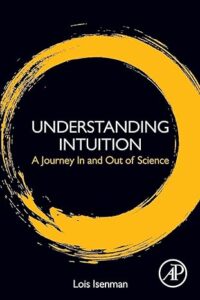
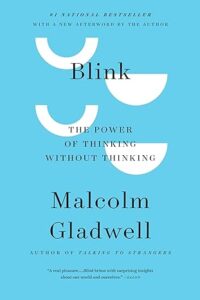

 I adhere to the Certified Coaches Alliance Code of Ethics and Standards. A copy is available on request.
I adhere to the Certified Coaches Alliance Code of Ethics and Standards. A copy is available on request.
 Let's Talk through the Connect Form:
Let's Talk through the Connect Form: